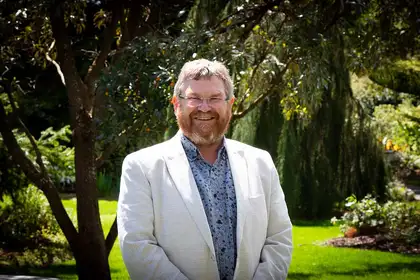
Associate Professor Kerry Taylor, head of the new School of Humanities, Media and Creative Communication.
A new grouping of scholars aims to strengthen collaborative research and raise awareness of the social impact of the humanities.
Associate Professor Kerry Taylor, head of the new School of Humanities, Media and Creative Communication, says merger of the former School of Humanities (of which he was the head) and the School of English and Media Studies within the College of Humanities and Social Sciences, is also a chance to try different things.
“The initiative for the merger came from the Pro Vice-Chancellor Professor Cynthia White. She identified that there were significant synergies between the former schools. Both had scholars who study and write creative literature, both had staff who study the nature and teaching of language and writing. Both were essentially concerned with the nature of humanity and the social and cultural manifestations of people and communities broadly defined.”
The new school – launched at the start of October – brings together philosophers, historians, linguists, classical studies and foreign language scholars with creative writing, literature, expressive arts, cultural and media studies experts.
Many are engaged in socially innovative research and community initiatives, such as expressive arts and theatre lecturers Associate Professor Elspeth Tilley and Dr Rand Hazou. Dr Tilley, in Wellington, works extensively with youth on justice and climate change projects through theatre and creativity with initiatives such as Create1World. Dr Hazou, on the Auckland campus, has spearheaded research to make theatre and creative processes available to prison inmates to address trauma and social injustice. And Māori philosopher Associate Professor Krushil Watene is leading ground-breaking scholarship on indigenous knowledge and how it can be applied to a wide range of global issues, from climate change to social inequality.
Dr Taylor, who describes himself as “principal cheerleader for humanities at Massey”, says the creation of the new school offers a chance for new opportunities. “The week we established the school we also launched a fundraising appeal with the Massey Foundation to support a new research fellowship named after Alison Hanham, a scholar who bridged the disciplines of language and history. Alison left a substantial bequest to the college, and this will allow us to create an annual Research Fellowship for a scholar to launch or complete a major research project.”
New research opportunities
He says there are teaching and research collaborations that will be easier with the larger school.
“All too frequently structures separate us from natural collaborations. We have a chance to do some things differently. For the profile of humanities within Massey and outside in the national and international academic and public sphere, there’s a chance for us to create an even more compelling narrative about our work, which is truly world-class. There’s an old labour movement phrase, ‘strength in unity’, which I think captures this nicely.”
He has load of ideas and is “extremely ambitious for our new school.” While there are no plans to cut programmes or staff, he’s keen on refreshing offerings, and introducing new initiatives and opportunities for Bachelor of Arts and Bachelor of Communication students.
Both degrees are in “good heart,” he says. “In recent years we’ve bucked the trend of decline some humanities and social science programmes [in other tertiary institutions] have experienced. This is testimony to our staff research and teaching, but also to the way we have consolidated our programme to address the real-world skills and aptitudes that we teach in the BA especially, with the introduction of tailor-made core papers on citizenship a few years ago.
“Skills in writing and communication, in critical thinking, in thinking about how to make a positive difference in society are core to the college disciplines. We have come a long way in beating the ‘BA = Bugger All’ mindset. Being confident and proud in what we offer students is a key to success and will be a cornerstone philosophy of the new school.”
Dr Taylor, a historian who specialises in the history of dissent and radicalism, doesn’t get much time for research, but has several long-term projects on the go. One is a collaboration with Canadian colleague Professor Greg Kealey, at the University of New Brunswick, on the Cold War origins of political surveillance in the Commonwealth. Another builds on his long-term research on communism in New Zealand. “I’m trying to write currently on the relationship between the New Zealand and Chinese communist parties in the 1950s and 1960s. This project began last year when I had a three-month fellowship at Peking University.”
The new School of Humanities, Media and Creative Communication has programmes on all three campuses and via online learning.